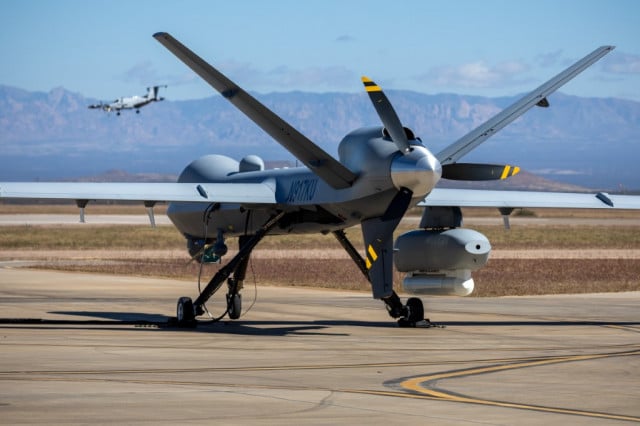Russian jet causes American drone to crash over Black Sea: US

- By Agence France-Presse (AFP)
- March 15, 2023 8:50 AM
Paris, France -- A Russian fighter jet on Tuesday dumped fuel on an American drone over the Black Sea and then collided with it, causing the drone to crash, the US military said, slamming the manoeuvre as "reckless".
US European Command said two Russian Su-27 fighters intercepted the unmanned MQ-9 Reaper over international waters and one clipped its propeller.
"Several times before the collision, the Su-27s dumped fuel on and flew in front of the MQ-9 in a reckless, environmentally unsound and unprofessional manner," it said.
Moscow denied causing the crash of the drone, which the Pentagon said was on a routine ISR (intelligence, surveillance, reconnaissance) mission.
"As a result of a sharp manoeuvre... the MQ-9 unmanned aerial vehicle entered an uncontrolled flight with loss of altitude and collided with the surface of the water," the Russian Defense Ministry said, adding that the two Russian jets had no contact with the US aircraft and did not use their weapons.
The US State Department said it had summoned Russia's ambassador to protest.
White House national security spokesman John Kirby later said, "obviously, we refute the Russians' denial" and added that the United States is trying to prevent the fallen drone from getting into the wrong hands.
"Without getting into too much detail, what I can say is that we've taken steps to protect our equities with respect to that particular drone -– that particular aircraft," Kirby told CNN.
"We obviously don't want to see anybody getting their hands on it beyond us."
- Regular intercepts -
Russian intercepts over the Black Sea are common, Kirby told journalists in Washington, but this one "is noteworthy because of how unsafe and unprofessional it was, indeed reckless that it was".
NATO diplomats in Brussels confirmed the incident, but said they did not expect it to immediately escalate into a further confrontation.
A Western military source, speaking to AFP on condition of anonymity, said that diplomatic channels between Russia and the United States could help limit any fall-out.
"To my mind, diplomatic channels will mitigate this," the source said.
Russia's invasion of Ukraine in February last year has led to heightened fears of a direct confrontation between Moscow and the NATO alliance, which has been arming Kyiv to help it defend itself.
Reports of a missile strike in eastern Poland in November briefly caused alarm before Western military sources concluded that it was a Ukrainian air defence missile, not a Russian one.
- 'Unflyable and uncontrollable' -
The United States uses MQ-9 Reapers for both surveillance and strikes and has long operated over the Black Sea keeping an eye on Russian naval forces.
"Our MQ-9 aircraft was conducting routine operations in international airspace when it was intercepted and hit by a Russian aircraft, resulting in a crash and complete loss of the MQ-9," said US Air Force General James Hecker, commander of US Air Forces Europe and Air Forces Africa.
"In fact, this unsafe and unprofessional act by the Russians nearly caused both aircraft to crash.
"US and allied aircraft will continue to operate in international airspace and we call on the Russians to conduct themselves professionally and safely," he added.
Pentagon spokesman Brigadier General Pat Ryder told journalists the drone was "unflyable and uncontrollable so we brought it down", adding that the collision also likely damaged the Russian aircraft, which he said was able to land following the incident.
Several US Reapers have been lost in recent years, including to hostile fire.
One was shot down in 2019 over Yemen with a surface-to-air missile fired by Huthi rebels, the US Central Command said at the time.
According to media reports, a US MQ-9 crashed in Libya in 2022, while another went down during a training exercise in Romania earlier in the same year.
Reapers can be armed with Hellfire missiles as well as laser-guided bombs and can fly for more than 1,100 miles (1,770 kilometers) at altitudes of up to 15,000 meters (50,000 feet), according to the US Air Force.
© Agence France-Presse















